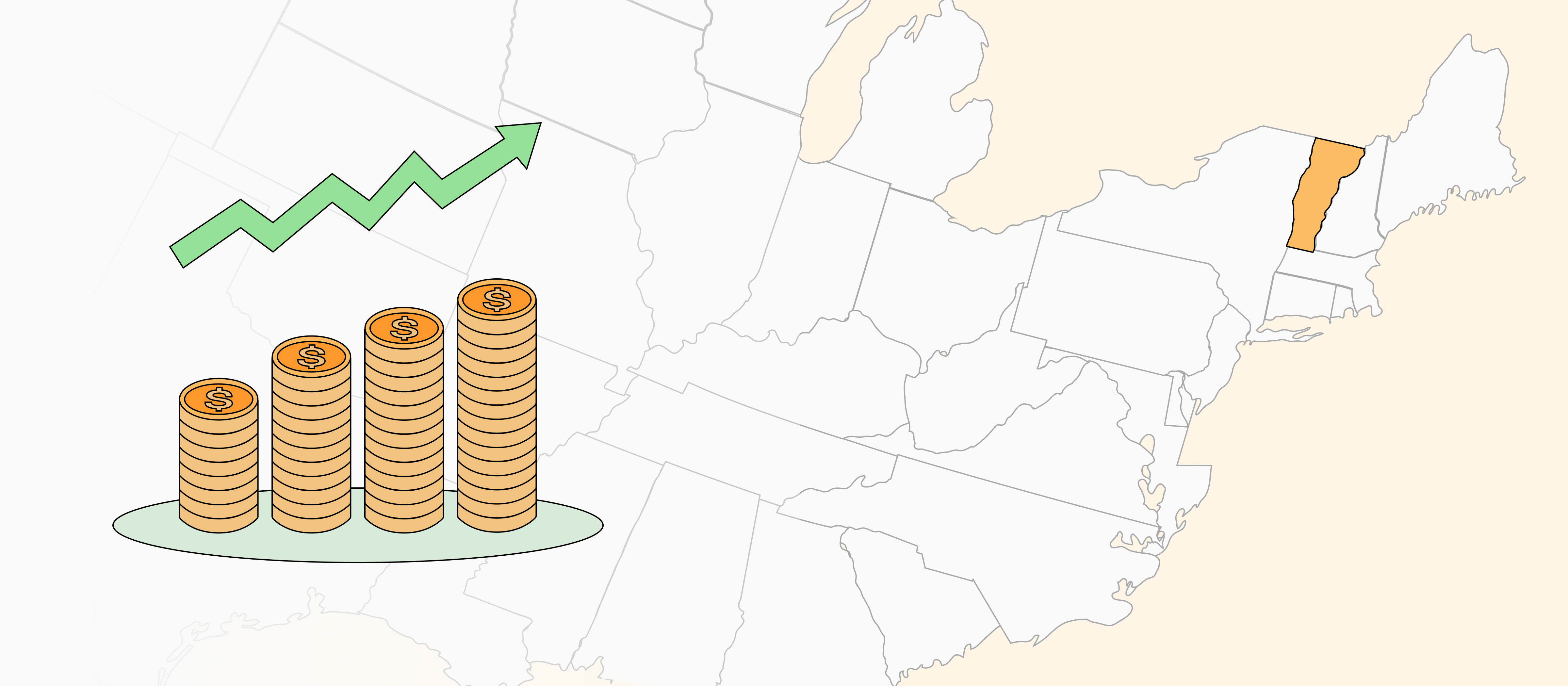| Rent Increase Facts | Answer |
| Reason Needed? | No |
| Maximum Amount | None |
| Required Notice | 60 Days |
Does Vermont Have Rent Control Laws?
Vermont does not have rent control laws limiting the rent amount that landlords ask for. State law allows local governments to pass their own rent control ordinances.
When Can a Landlord Raise Rent in Vermont?
Landlords in Vermont can raise the rent at any time, as long as they comply with the following:
- Wait until the end of the lease term (unless otherwise specified in the lease)
- Aren’t raising rent for discriminatory or retaliatory reasons
- Give reasonable notice
- Don’t break any rent control laws
60 days before the end of a year-long lease, a landlord sends a notice that rent will increase by 8.5% if they choose to renew the lease.
When Can’t a Landlord Raise Rent in Vermont?
Landlords in Vermont may not raise the rent if:
- It is during the middle of a lease’s fixed term (unless stated otherwise in the lease agreement)
- The increase is applied in a way that discriminates against one of the protected classes specified in the Fair Housing Act
- It is done in retaliation against a protected tenant action, such as a tenant complaining to the landlord regarding their obligations
- The increase is higher than what’s allowed under rent control laws
In addition to the characteristics above, the Vermont Fair Housing Act prohibits discrimination due to marital status, age, receipt of public assistance, or status as a victim of abuse.
How Often Can Rent Be Increased in Vermont?
Landlords in Vermont can increase the rent as often as they choose as long as they provide sufficient notice each time.
How Much Notice is Needed To Raise Rent in Vermont?
Vermont landlords cannot raise the rent during a lease term and by default must give 60 days’ notice to increase the rent. City laws may exceed the state requirement. For example, in Burlington, landlords must give 90 days’ notice before a rent increase.
For mobile home tenants, landlords in Vermont must use the notice letter approved by the Department of Housing and Community Development. In 2025, if the rent increase exceeds 5.4%, the tenants are eligible to have mediation services provided in rental disputes.
How Much Can a Landlord Raise Rent in Vermont?
Vermont landlords may raise the rent by any amount. There is no legal limit or cap on the amount of a rent increase.
Sources
- 1 Vt. Stat. tit. 9 § 4465(a)
-
A landlord of a residential dwelling unit may not retaliate by establishing or changing terms of a rental agreement or by bringing or threatening to bring an action against a tenant who:
(1) has complained to a governmental agency charged with responsibility for enforcement of a building, housing, or health regulation of a violation applicable to the premises materially affecting health and safety;
(2) has complained to the landlord of a violation of this chapter; or
(3) has organized or become a member of a tenant’s union or similar organization.
Source Link - 2 Vt. Stat. tit. 9 § 4455
-
An increase in rent shall take effect on the first day of the rental period following no less than 60 days’ actual notice to the tenant.
Source Link
- 3 Burlington Code of Ord. § 18-29a(c)
-
No increase in rent for rental housing within the city shall be effectuated without at least 90 (ninety) days’ advance written notice to the tenant(s).
Source Link - 4 Vt. Stat. tit. 10 § 6251(a)
-
A mobile home park owner shall provide written notification on a form provided by the Department to the Commissioner and all the affected mobile home park leaseholders of any lot rent increase no later than 60 days before the effective date of the proposed increase. The notice shall include all the following:
(1) the amount of the proposed lot rent increase, including any amount of the increase that is attributable to a surcharge for any capital improvements of the mobile home park pursuant to subsection (b) of this section, the estimated cost of the capital improvements, and the proposed duration of the surcharge prorated in 12-month increments sufficient to recover the estimated cost of the capital improvements;
(2) the effective date of the increase;
(3) a copy of the mobile home park leaseholder’s rights pursuant to this section and sections 6252 and 6253 of this title; and
(4) the percentage of increase from the current base lot rent.
Source Link

